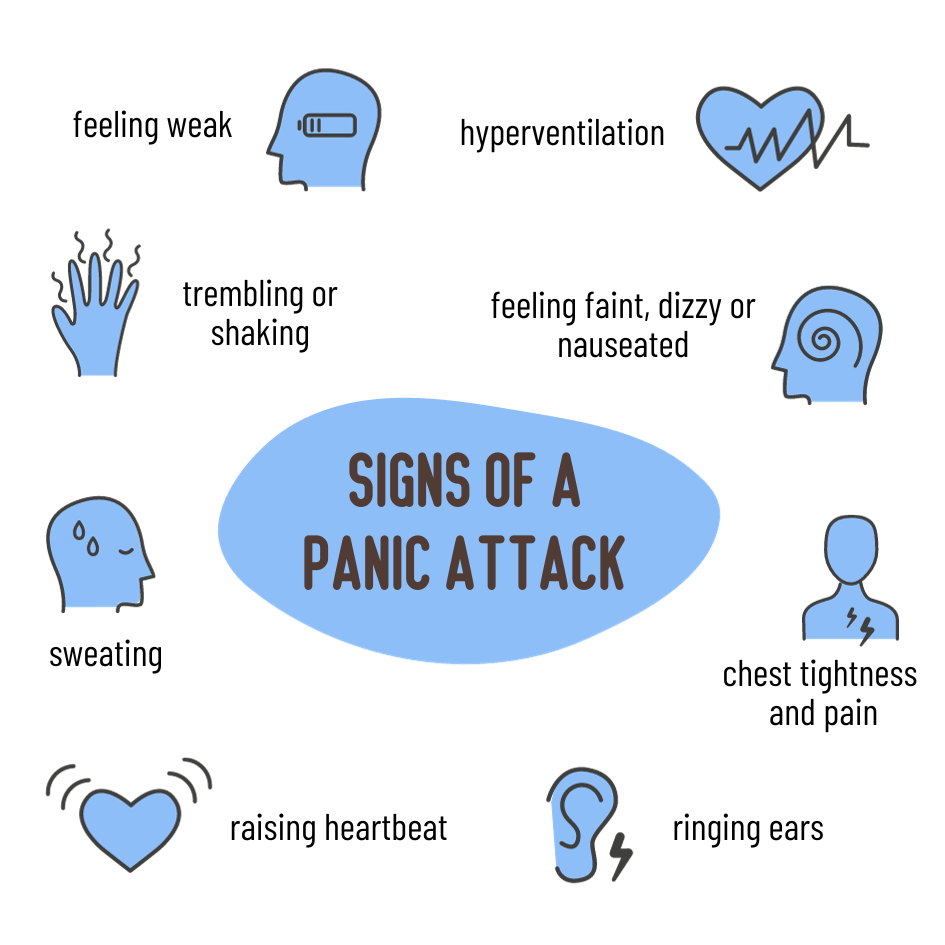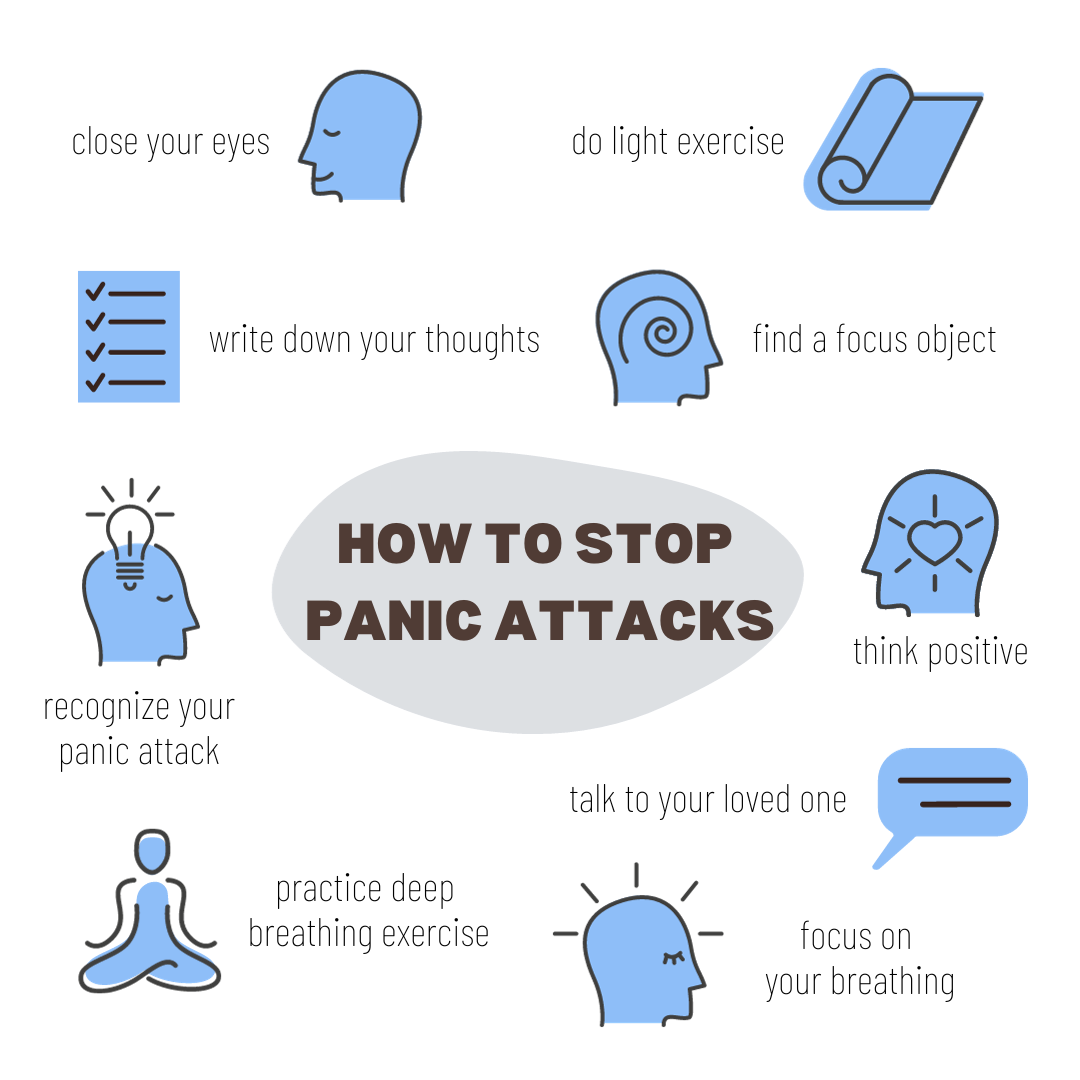How to Stop a Panic Attack
The Unpredictable Nature of Panic Attacks and Regaining Control
In the realm of mental health experiences, panic attacks hold a uniquely unsettling position. They can emerge without warning, often catching individuals off-guard, and plunging them into an intense whirlwind of anxiety and fear. For those unfamiliar with their intricacies, the sudden onset of a panic attack can be both bewildering and terrifying, mimicking the symptoms of more severe medical conditions and thus magnifying the fear tenfold.
Exploring the underlying processes of a panic attack is not merely an academic exercise; it is an essential step toward mastering them. By gaining a deeper comprehension of what triggers these episodes and the physiological responses they induce, one is better equipped to face them head-on, rather than being caught in their tumultuous grip.
Moreover, with the right knowledge, tools, and coping strategies, the looming threat of a panic attack becomes less daunting. Preparedness and understanding can dramatically reduce the duration and intensity of the attack, transforming a seemingly insurmountable experience into a manageable one.
Whether you are reading this because you personally encounter these unsettling episodes or you’re concerned for a loved one who does, rest assured that this guide is meticulously crafted to arm you with actionable, effective steps. These steps are not mere quick fixes but are grounded in therapeutic practices and expert recommendations, all aimed at helping you or someone you know regain control when a panic attack strikes.
The Impact of Panic Attacks
These attacks don’t just manifest as mental or emotional symptoms. They can also cause a myriad of physical sensations that may include a racing heart, trembling hands, dizziness, and shortness of breath, among others. Over time, if left unchecked, they can lead to a reluctance or even fear of venturing outside, thus limiting one’s life experiences and quality of life.
What is a Panic Attack?
A panic attack, at its core, is an abrupt and intense onslaught of fear and anxiety, often emerging without any evident precipitating factor. This spontaneous eruption of overwhelming emotions can be disconcerting, especially given its unpredictable nature.
When one undergoes a panic attack, a series of physiological and psychological reactions occur, making it all the more distressing for the individual. These symptoms manifest both internally and externally, giving both the person experiencing it and those around them clear signs that something is amiss.
Common Symptoms of a Panic Attack Include:

- Rapid Heartbeat: One of the most immediate reactions, this heightened pulse often exacerbates the feeling of anxiety.
- Profuse Sweating: Even without any physical exertion, an individual might find themselves sweating heavily.
- Trembling or Shaking: This involuntary physical response can be particularly unsettling.
- Shortness of Breath: A sensation that can sometimes be mistaken for more severe respiratory issues.
- Choking Sensation: This can create a heightened sense of panic, further intensifying the attack.
- Nausea: A feeling of unease in the stomach, sometimes accompanied by the urge to vomit.
- Dizziness or Lightheadedness: This can sometimes lead individuals to need to sit or lie down.
- Fear of Losing Control or Unraveling: An overpowering emotion that can compound the anxiety being felt.
- Feeling Detached from Reality: Often described as a sensation of being in a dreamlike state or feeling outside one’s own body.
Despite the acute distress and myriad of symptoms they provoke, it’s crucial to recognize that panic attacks, in themselves, are not harmful to physical health. They don’t cause any physiological damage, even if they feel life-threatening at the moment. However, understanding them and having coping mechanisms in place can make a world of difference in managing their impact on one’s mental well-being.
Steps to Stop a Panic Attack:

-
Recognize The Attack
- Understand that you are experiencing a panic attack and not a life-threatening situation.
- Remind yourself that this feeling will pass.
-
Grounding Techniques
- 5-4-3-2-1: Identify five things you can see, four you can touch, three you can hear, two you can smell, and one thing you can taste.
- Hold onto an object and focus on its temperature, texture, and other physical qualities.
-
Focused Breathing
- Take slow, deep breaths. Inhale through your nose for a count of four, hold for four, and exhale through your mouth for a count of four.
- This helps to calm the rapid breathing often associated with panic attacks and provides a focus point.
-
Challenge Your Thoughts
- Remind yourself that your panic is not a reflection of reality. Challenge and reframe any negative or irrational thoughts.
- Example: Instead of thinking, “I’m going to die,” tell yourself, “It’s just a panic attack and it will pass.”
-
Safe Place Visualization
- Close your eyes and imagine a place where you feel calm and safe.
- Engage all your senses in this visualization. What do you see, hear, smell, touch, and taste?
-
Progressive Muscle Relaxation
- Tense up a group of muscles, keep them tense for a few seconds, and then release.
- Start from your toes and work your way up.
-
Anchor Yourself
- Sit down if possible.
- Plant your feet firmly on the ground and focus on the feeling of the floor beneath you.
-
Avoid Caffeine and Sugar
- These can provoke panic attacks in some people.
-
Reach Out
- Talk to someone you trust about what you’re experiencing.
- Sometimes, simply sharing your feelings can reduce the intensity of the attack.
-
Use a Mantra
- Repeating a comforting phrase or mantra can help divert your attention from the panic and refocus your mind.
- Example: “This too shall pass” or “I am safe and in control.”
Long-Term Strategies for Managing Panic Attacks and Maintaining Mental Well-Being
-
Embrace Meditation and Deep Breathing Techniques
Regularly immersing oneself in meditation practices can foster a deep-rooted sense of tranquility and mental clarity. Meditation teaches the mind to focus on the present moment, training it to deflect wandering and often anxiety-provoking thoughts. Coupled with deep breathing exercises, these practices can act as an anchor, helping individuals stay centered even amidst turbulent emotional seas. By making meditation and deep breathing a habitual practice, you are building resilience against stress and creating a mental buffer that can be invaluable during high-anxiety situations.
-
Prioritize Physical Activity
The benefits of regular physical activity extend beyond just physical health. Engaging in routine exercise acts as a natural stress-reliever, releasing endorphins – the body’s own feel-good chemicals. Whether it’s a brisk walk, a session at the gym, yoga, or any form of physical exertion you prefer, integrating it into your daily or weekly routine can lead to significant reductions in anxiety levels. Over time, this consistent activity can decrease the frequency and severity of panic attacks.
-
Monitor and Adjust Your Caffeine and Sugar Intake
It’s no secret that what we consume can have a profound effect on our mental state. Both caffeine and sugar can act as stimulants, potentially exacerbating anxiety and triggering panic attacks in susceptible individuals. By carefully monitoring and possibly reducing or eliminating your intake of these substances, you can ascertain their impact on your anxiety levels. Some might find that even slight reductions lead to noticeable improvements in overall mental well-being.
-
Consider Professional Therapy
While self-help techniques and lifestyle changes play a pivotal role in managing anxiety and panic attacks, the insights and support of a trained therapist can be invaluable. Engaging in therapy allows for a deep dive into the underlying causes and triggers of your panic attacks. A therapist not only provides a safe space to express and process these emotions but can also introduce evidence-based techniques and coping strategies uniquely tailored to your individual needs and experiences. Regular therapeutic sessions can pave the way for long-term mental health improvement and resilience against future panic episodes.
By adopting and integrating these long-term strategies, individuals equip themselves with a holistic arsenal to combat the challenges posed by anxiety and panic attacks, leading to a more serene and balanced life.
Why Professional Help Matters
Managing panic attacks on your own can sometimes feel like a never-ending battle. While self-help strategies can be effective, they’re not always enough. This is where professional intervention can make a significant difference.
A therapist can dive deeper into understanding the root causes of your attacks. Are they tied to past trauma? Perhaps they are linked to certain deeply held beliefs or fears? Or maybe they’re a manifestation of an underlying anxiety disorder. Whatever the cause, a therapist can help unpack these triggers and provide insights that may not be apparent to the sufferer.
Therapy provides a safe space to express and process these feelings. Using evidence-based techniques, a therapist can guide you in developing personalized coping strategies, enhancing your resilience, and rebuilding your confidence.
Reach Out For Personalized Care
If you find yourself frequently grappling with the debilitating effects of panic attacks, remember that you don’t have to navigate this journey alone. Seeking assistance is not a sign of weakness but rather a step towards empowerment and well-being.
As a therapist specialized in this field, I am here to support, guide, and provide the tools you need to reclaim your life. Together, we can work to understand the nuances of your experiences, and I can offer tailored strategies that align with your individual needs.
Don’t let panic attacks define your life. Contact me today, and let’s embark on a journey towards a calmer, more centered you.
Remember, you’re not alone in this journey, and help is always available.